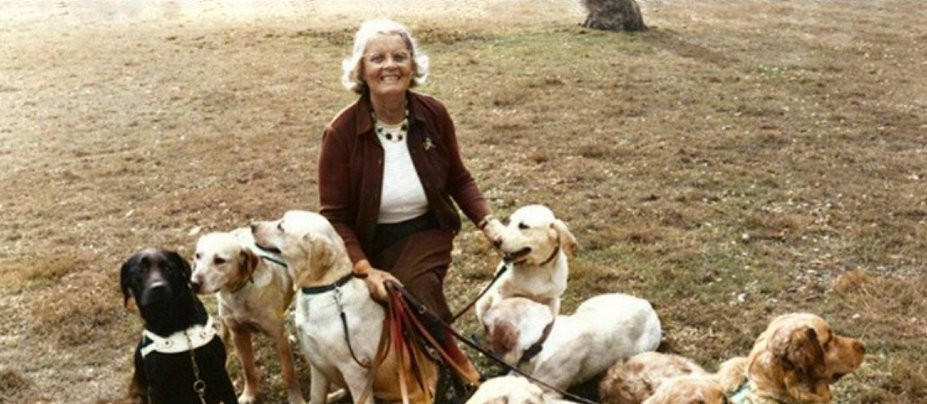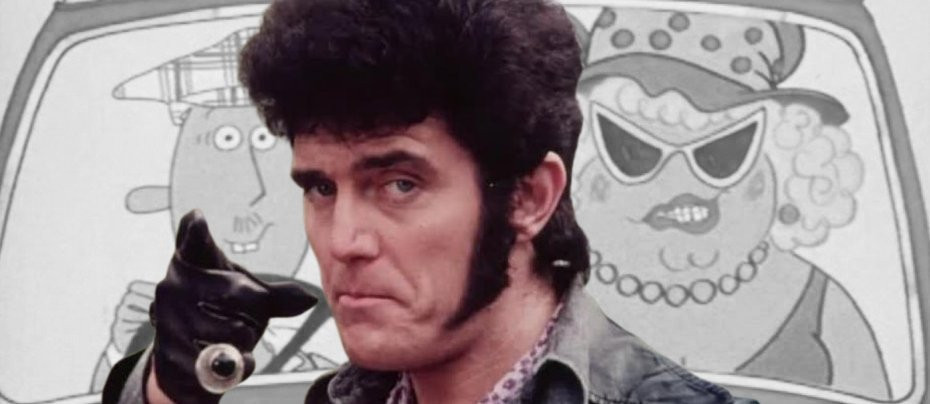
For Your Information
The Best Public Information Films of the 1970s
Fondly recalled by Andrew Cobby
One afternoon, towards the end of a particularly tedious seven hours and 24 minutes at work, a colleague said ‘Aaaah, ‘as been a good day.’ I admired the irony of the words but I admired her knowledge of 1970s television even more when she went on to say ‘I’ve been working among horses all my life’.
These words are taken from a public information film shown probably some time in the late 1970s. Work may steal your soul but it can never rob you of the memory of watching public information films, or PIFs for short.
PIFs were a great way to spend a couple of minutes or so between programmes.
I must have watched dozens of them hundreds of times over. I watched them so many times that I can quote large chunks of some of them word for word. That’s the thing about watching something over and over again. You may not realise it at the time but you’re taking it all in, ready to regurgitate it at a time that suits.
The subject of the PIF that brightened up my working day was the dangers of smoking late at night. Don’t do it, the PIF warns, or you might start a fire.
Fire safety was a popular subject, as were driving sensibly, learning to swim and keeping kids from harm.

One of my favourites is the one about the fire doors because as one who has spent all his working life in an office, I am pleased that someone is looking out for the interests of bureaucrats everywhere.
Tea lady Patsy Rowlands is moaning about having to manipulate her tea trolley through the corridors. Those irksome fire doors are restricting her free movement. Her executive friend Peter Cleall, aka Duffy from Please Sir!, thoughtfully wedges them open so that Patsy can go cheerfully on her way.
‘I’ll remember you in my will’ she says, which I think can be considered an ironic comment.
Duffy expounds on the stupidity of having to leave doors closed to his speechless workmate who signals his agreement with a casual wipe of his nose. He daren’t say anything to contradict him because Duffy has a stronger personality than him and he doesn’t want to be made to feel stupid.
Duffy is both the answer to Patsy’s problems and the cause of them as he thoughtlessly leaves his cigar to smoulder away and, without the closed fire doors to arrest it, the fire spreads throughout the building.
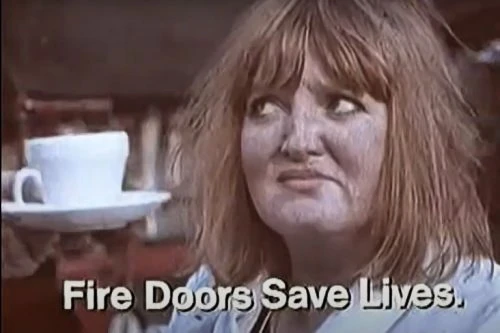
A sheepish look breaks across the smoke-blackened face of the tea-lady as she is handed a cup of tea by a thoughtful fireman. What a great actress Patsy Rowlands was.
Feeling the hot breath of the fire brigade on his neck Duffy decides to make a quick getaway. His plans are scuppered when he only causes confusion at the British Rail ticket office by asking for ‘a secodd glass returd doo dottig-hab’.
Those wondering what that last bit is all about should type ‘duffy tunes advert’ into the Google search field and then sit back and let it work its magic.
The animated Joe and Petunia films play to the comic stereotype of the large woman being paired with an ineffectual male partner.
They made four Joe and Petunia films. Two were based at the seaside, one in the countryside and the fourth on the roads. Joe was played by the voice of them all, the excellent Peter Hawkins.
In the first three Petunia was, apparently, voiced by Wendy Craig. I could watch those films until the cows come home and I would never guess that Petunia and Wendy Craig were one and the same. Her voice here appears to have a higher cadence than I remember from her work in Butterflies.

The consequence of watching these particular PIFs is that, whenever I am at the seaside, I expect to see a large lady sitting beside a weedy looking husband, noisily licking an ice cream as her other half ignores a maritime disaster unfolding before his eyes.
Even better, in my opinion, is the one where Joe and Petunia are in the countryside and Joe spots an irate farmer who has been maddened by their thoughtless actions in leaving gates open, dismantling dry stone walls, smashing bottles and letting their dog worry the sheep. Purple faced and stamping his feet when first seen, the farmer turns out to be a reasonable chap frustrated by the thoughtless ways of town dwellers. Why oh why won’t they follow the country code?
The fourth and final film has Joe and Petunia in a car with bald tyres. It’s a powerful film as their vehicle is shown spinning out of control before the animation turns into a real-life shot of a car being crashed into a tree. Joe and Petunia’s ghostly voices are heard from on high commenting on the view and the clear implication is that they have been killed. On a more cheery note, Petunia is voiced here by Brigit Forsyth, the dreadful, wonderful Thelma from Whatever Happened to the Likely Lads and I am happy to report that I had no difficult at all in recognising her voice.

Next up, pop-pickers, we have Alvin Stardust with ‘You must be out of your tiny minds’. I would love to have heard those words spoken over the radio as an introduction to Alvin’s latest record before I traipsed off unwillingly to school. It would have brightened up the morning because, regardless of the season, 7 a.m. was a lot darker before breakfast telly.
Although they would have made a great title for a pop song, they are actually the words uttered by Alvin at the start of his short film on the Green Cross Code. He is walking down the street when he spots a couple of kids crossing the road without looking and narrowly avoiding being hit by passing cars. Appalled by their carelessness, he shows them the error of their ways. With his long sideburns, operatic gestures and ring worn over his glove, it is good to know that Alvin was still a showman even out of office hours. Alvin joined such musical heavyweights as Les Gray from Mud and Joe Brown in a concerted effort to ensure that youngsters weren’t knocked down every time they tried to get from one side of the street to the other. They were a sort of more with-it Tufty Club.
I particularly liked the Joe Brown one. It starts like an episode of Budgie, in which Mr Brown returns to the streets in a flash sports car so that he can taunt his old pre-Beatles mate with how well he’s doing. Before he can do this, he is accosted by a couple of lovable cockney kids, Dave and Eric, who teach him how to cross the road. It is a nice twist on the usual PIF in which it’s the square old adults doing the teaching.
Young Dave seems a particularly talented lad and, had we had a colour TV at the time, I would certainly have cast covetous little eyes over Dave’s amazing technicolour tank top. His mate Eric has only a supporting role so that unfortunate boy has less chance to shine but Dave would have been great as a class mate of the gang at Fenn Street School in Please Sir! Unlike the rest of the class, he looks to be of school age so there would be no danger of anyone mistaking him for a teacher.
What the situation on the roads was really crying out for was an appearance from Suzi Quatro. Joe and Alvin were personable enough and got the message across, but they didn’t really have the authority of the rocker from Detroit. Whenever I saw her on Top of the Pops I always thought she was well capable of beating up all the other bands that appeared on it. The word on the Pops is that she canned Carl Douglas’s can particularly severely for thinking he was hard with his kung fu fighting. The moral of that story is that if a lady in leathers and platforms stomped across the pavement to give you earnest advice in an American accent you should certainly take it, then and now.
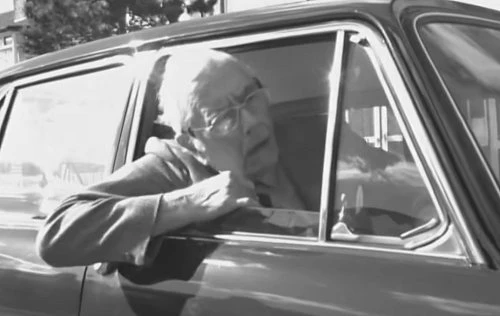
Reginald Molehusband, the safest parker in town, became famous for eventually managing to manoeuvre his car into a tight space backwards. I envy Reginald his parking skills. I can drive perfectly well in a forward direction but, when required to do a bit of reverse parking, my spatial awareness goes all to pot. I attribute this to being left-handed while my wife puts it down to me being ‘a bloody idiot who shouldn’t be allowed on the roads’.
Whatever the reason, I tuned in to YouTube expecting to marvel again at Reginald’s look of satisfaction as he safely completes his manoeuvre. Dear oh dear, someone has gone and mislaid the film. How does a film get lost, especially one as memorable as this one? It should have been kept under lock and key at all times.
PIFs display a laissez-faire attitude to some societal issues that I don’t think we would see today. PIF-makers knew the British public were going to smoke regardless and, instead of trying to change this, they reminded us not to smoke in bed or to put our fag end out properly.
There was at least one PIF that concentrated on the dangers of kids being locked in fridges. Look kids, the PIF-makers appeared to be saying, there will be times when you’ll come across abandoned household appliances when you’re out playing, we know that and you know that. If you see any carelessly discarded fridges, for God’s sake don’t climb inside one or you may not get out again.
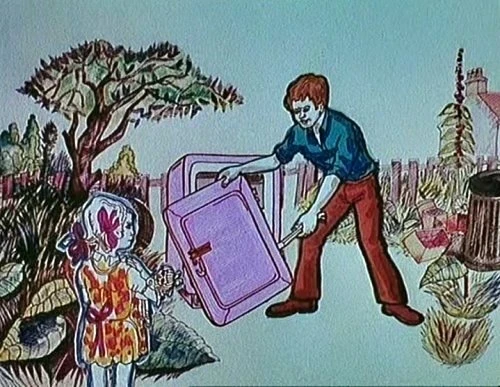
They are treading a fine line between being informative and scaring the living daylights out of the younger viewing audience. I was terrified by The Lonely Water film. A sinister hooded figure lurked in the background as youngsters played near water. The foolish ones and the show-offs fell in and, presumably, drowned.
The power of the hooded figure was redundant when faced with sensible kids because they would be careful near water. They would run and fetch an adult if they saw someone in trouble in the water. The more resourceful kids would put what they had seen on Why Don’t You? to good use and fashion a raft from bits of wood so that they could set sail on a rescue mission.
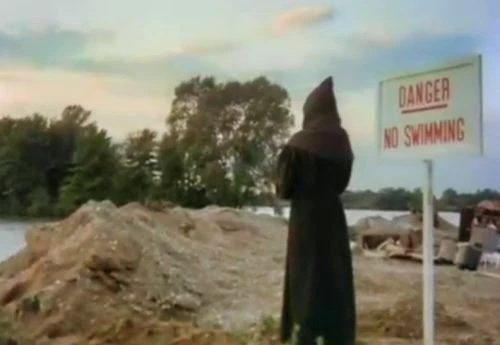
This PIF had me doubting myself. I liked to think of myself as a sensible kid, but was I? I had seen loads of episodes of Why Don’t You? and hadn’t learned a thing. If I came across a stretch of water would I be able to stoically resist its temptations or would I just jump in, prompted by my own stupidity or a desire to impress other kids?
This PIF is in my top three scariest moments from watching TV as a kid. The other two are the ITV series Thriller (any episode but particularly the one where the blonde American lady is stalked by a bald man) and the Hywel Bennett film The Twisted Nerve. What was I thinking staying up to watch this or, more to the point, what were my parents thinking to let me stay up and watch it?
The sinister figure in the Lonely Water PIF was voiced by Donald Pleasance and I have been wary of Mr Pleasance ever since. Whenever I catch the Any Old Port in a Storm episode of Columbo, in which he plays the baddie, I always give a little cheer when he gets his comeuppance at the hands of the tec with no first name.
There is a better PIF on learning to swim. It is the one in which the young lady is daydreaming about Dave when, pow, up pops her fairy godmother with a ‘I’ll give you three wishes routine’. The kindly fairy godmother summons up Dave. In spite of being able to play the guitar, ride a motor scooter and play football, Dave doesn’t know how to swim so the young lady ditches him in favour of Mike who, she tells us, swims like a fish.
This prompts Dave to summon up his own fairy godmother to complain that he wished he didn’t keep losing his birds. ‘Then learn to swim, young man,’ says the fairy, ‘Learn. To. Swim.’
I have no idea who voiced Mike or the godmother but the voice of Dave sounds like that of the ubiquitous Peter Hawkins. The young lady sounds to me like his namesake Carol Hawkins, aka Sharon from Please Sir! and The Fenn Street Gang but, then again, it could be Wendy Craig doing another excellent job of disguising her voice.
The language and the clothes mark the film out as of its time but, if you ignore these trifles, it becomes timeless. It was always on TV when I was growing up and I am still able to quote it word for word. I am not particularly proud of this fact but I wouldn’t say I was ashamed of it either.
I think those at the Central Office of Information must sometimes have become bored with reminding viewers to cross the road safely or learn to swim. For a change, they decided to make a PIF on the dangers of putting a rug on a newly-polished floor.
They may not have known it at the time but they were making a classic. A young couple return home from hospital with their newborn baby only for the young father to slip on the rug placed on a floor that’s just been polished by his mother-in-law. The viewer doesn’t see the young man slip but the shocked reaction of his wife and mother-in-law, and the young man’s comic yelp, let the viewer know exactly what has gone down. And to think he had only just come from the hospital.
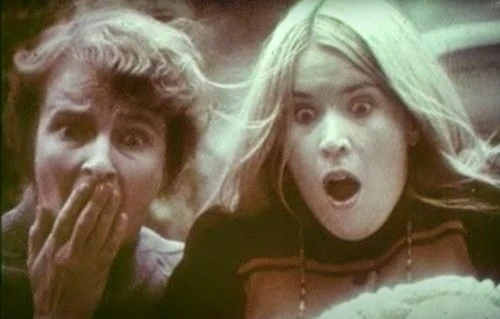
That comedy yelp is a nice touch. It is the comedy yelp against which I judge all other comedy yelps and, I must say, as of the time of writing all those that have come after it have been found wanting.
I realise I am making a couple of assumptions here – was the young lady his wife, was the older woman his mother-in-law? Well, this is the 1970s so the answer to those questions are yes and yes.
The film benefits from jaunty incidental music and a portentous commentary. The crowning glory is when the rug changes into a man trap to reinforce the words of the commentary.
It is such an idiosyncratic danger to warn the viewing public about that I tend to think it is borne out of bitter experience or it may be that, as the title of the PIF is The Fatal Floor, someone at the Central Office of Information couldn’t resist a pun.
Irony also rears its head at the end of the PIF about the dangers of bike theft. I like to think of this one as the ‘Zulu’ of public information films in that it is choc full of quotable lines.
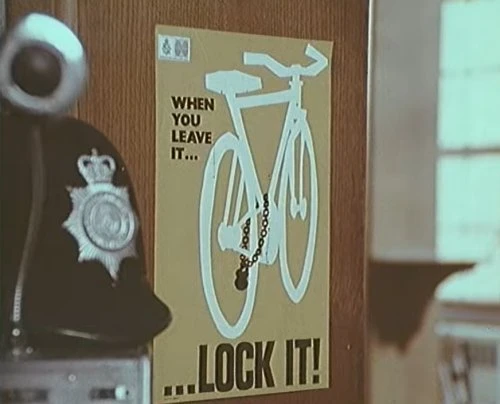
A various cross-section of British society are shown reporting the theft of their bikes at the local police station.
‘A bike’s a bike. How do you describe a bike?’ asks a well-spoken businessman type, impatient at the impertinence of such a question.
‘Do you think you’ll be able to find it, mister?’ asks a young lad rhetorically as he looks up at the policeman.
‘Nobody’ll not pinch it round here’ says an old gent hopefully.
‘Well somebody pinched it, didn’t they?’ replies the policeman, fed up to the back teeth with members of the public doing absolutely nothing to help themselves.
I think we can all draw our own 1970s conclusions about the young chap in the hat and scarf who would rather not discuss the personal things he had left in his saddle bag. I miss those days when you would regularly see a little saddle bag swinging happily from the seat of a passing bicycle. Cyclists don’t use them now – the lycra wouldn’t like it.
Frank Windsor provides the commentary for this one and, although he does his best to keep a lid on it, the viewer knows that he is quietly livid at the carelessness of the country’s bicycle set. Calm down, Frank. The way you’re going you’d think it was your bike that got pinched.
The PIF has a lovely twist at the end when a policeman plonks his helmet on the front desk and tells the sarge that someone has just nicked his bike. Whoever made this PIF could certainly have shown the makers of Tales of the Unexpected how to play it.
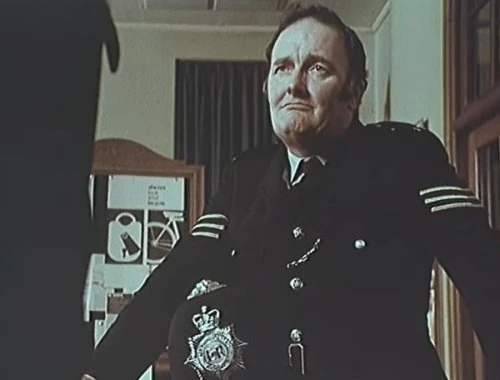
For anyone interested, the desk sergeant is played by Ivor Salter. Those of a certain age will recognise Mr Salter’s face. He turns up regularly, usually as policemen although I remember first seeing him as someone or other in Crossroads.
And now I would like to make a public appeal. In the old days I would have sent it in to Police Call. This was the Tyne Tees version of Police Five but, instead of glamorous Shaw Taylor, we had a crusty old policeman from Northumbria Constabulary appealing for help in solving crimes and finding lost dogs. Along with Where the Jobs Are, it was an exploratory attempt by Tyne Tees at interactive television. Anyway, here goes:
Does anyone remember a PIF about road safety in which an office worker gets a promotion for treating an elderly pedestrian with courtesy? He patiently lets the pedestrian cross the road after one of his colleagues, a man in driving gloves, has impatiently driven past with a scowl on his face. This is all witnessed by the office boss who recommends a promotion for the polite office worker, even though he is sniffily judged to be ‘rather ordinary’ by the secretary. Quite rightly, Mr Driving Gloves gets nothing but contempt from the big boss man.
I am beginning to wonder if I have made this film up. The PIF isn’t on YouTube and no one I have spoken to recognises it.
Public information films lasted for a couple of minutes at the most. In spite of their short running time and lack of fanfare - they were never included in the schedules - they deserve all the benefits of a blockbuster. They should be topped by that bloke banging the gong and tailed by a cast list and production credits. For the full cinematic experience, there should be an intermission round about the one minute mark so that you can nip to the shops for a choc ice.
Sometimes when it’s raining and I haven’t got an umbrella I say to myself in a sing-song sort of way ‘Wish I brought my brolly’. These are the final words of a PIF aimed at teaching viewers how to use pelican crosses. It sounds to me like the voice of Deryck Guyler, unless it’s Wendy Craig up to her old tricks again. Pelican crosses are so commonplace now that it seems strange that we would require instructions on how to use them.
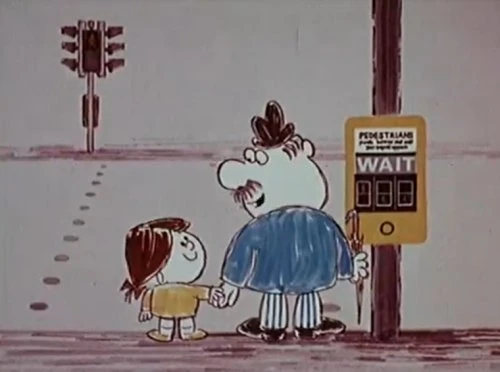
I can’t be the only person to quote Mr Guyler just as I can’t be alone in being able to recite that Learn To Swim film word for word. Television brings us together, talking about it makes the day go quicker at work and gives us something to discuss other than the weather.
Every Sunday I act as a marshal for the parkrun at John Whitehead Park in Billingham. As the runners pass me on the final lap I send them on their way with a cheery ‘Have a good week till next week’. I’ll admit, it’s a blatant steal of the farewell message used by commentator Kent Walton at the end of the week’s action in the wrestling ring on World of Sport.
The intention is that, if one of the runners recognises it, it could lead to a rewarding conversation in which we would discuss Saturday afternoon viewing habits of long ago. If the steal goes unacknowledged, it’s still a positive and friendly message to give out. So far not one runner has recognised it and, as it is a junior parkrun in which the average age of the runners is well under ten, no one is ever likely to. I live in hope that one day a grandparent shepherding a young one round the course will recall the words and stop for a chat.
Produced without an eye to the future, public information films present an enduring picture of Britain as it used to be. For all that, I still feel a little short-changed by some of the role models on view. We had all white, mostly male figures to keep us on the straight and narrow. Kids today have a more diverse cast list to choose from. If it were made now that bike theft advert would have a more disparate set of characters. We move on, we assimilate and we become all the better for it.
Street-wise characters like Stormzy or Ru-Paul, perhaps, would be used to warn our kids of the dangers of modern life but, then again, kids today have a lot more to think about than crossing the road safely and making sure they don’t get trapped in fridges.
To help maintain a mental equilibrium I try to accentuate the positive and assume that most of us are fundamentally decent. PIFs make this assumption too. Yes, we can be thoughtless, careless and thoroughly bad drivers at times but there is little wrong with us that some gentle chastisement can’t put right.
As they were made in the 1960s and 1970s, they were aimed solely at our physical well-being. We were exhorted to be careful on the roads, not to smoke in bed and not to put rugs on polished floors.
PIF makers didn’t care about our mental health but they can’t really be blamed for that because hardly anyone else gave tuppence for it either.
If there had been a PIF about mental well-being, it would have taken a tough-love approach. A stern voice would intone ‘Britain – pull yourself together’ and, with a touching literalness, the words would be spoken over film showing a pair of curtains being resolutely closed.
The voice-over would be provided by someone authoritative like Patrick Allen or, to give him his Native American name, Two Tribes. After solemnly advising the nation how to survive nuclear war in those Protect and Survive films, telling us to pull ourselves together would be a piece of cake for him.
There is no need to worry about Two Tribes stuffing his face with Victoria sponge because he had the foresight to also give voice to a public information film on the safest way to eat pieces of cake.
The film is lost now but if it is ever found it will be in the company of Reginald Molehusband and, assuming he ever existed, that office worker who got a promotion for being a considerate driver.
Published on February 6th, 2023. Written by Andrew Cobby for Television Heaven.






